WFA Student Representatives
If you want to learn more about becoming a student rep for WFA, click here >
Student Rep Coordinator - Tyler Brasington, 2024-
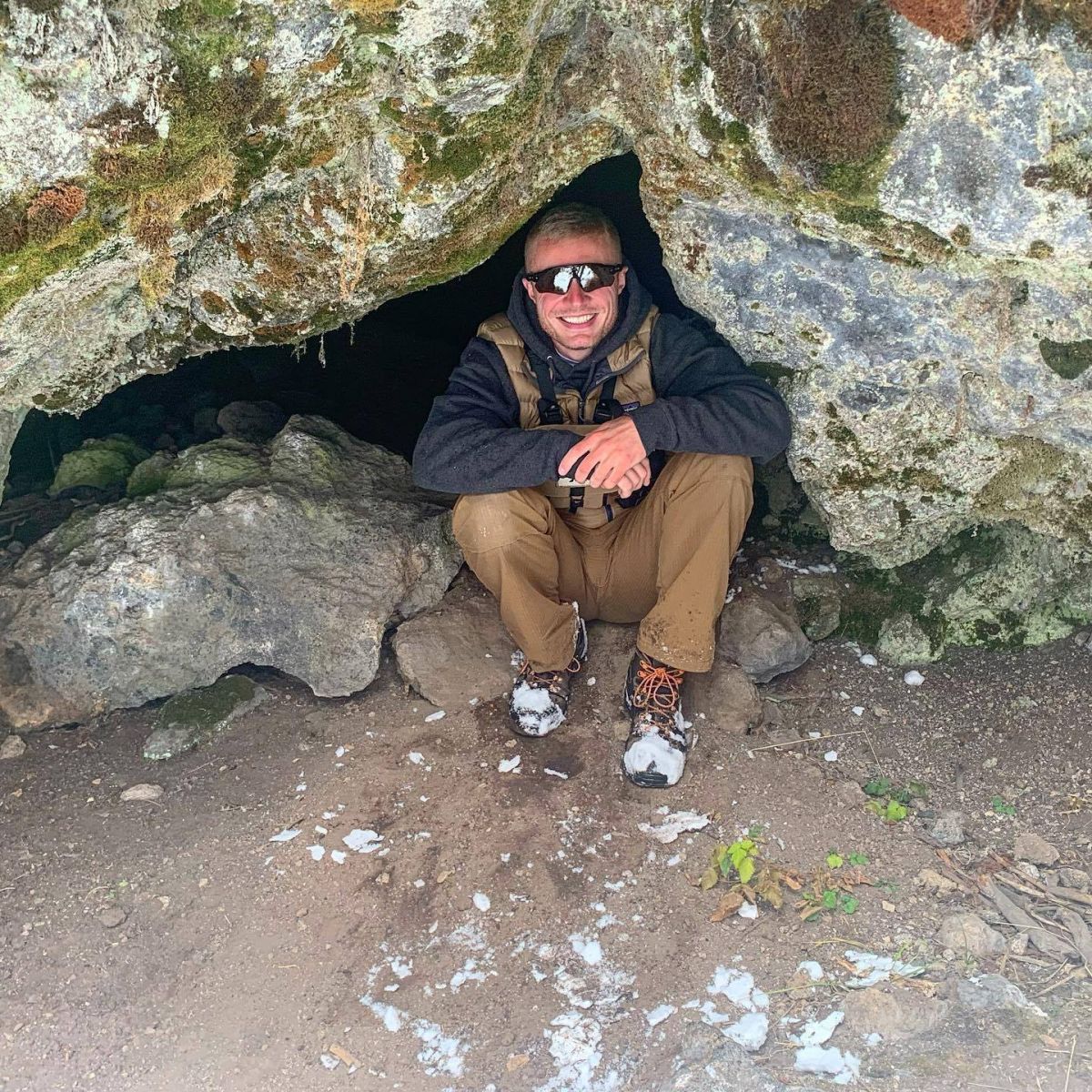
Tyler is a biologist and large carnivore conflict specialist based in Moran, Wyoming. His research interests primarily focus on large carnivore conflict management, movement ecology, spatial analysis, physiology, wildlife diseases, and studying the periodontal health in carnivores. Tyler’s current research is dedicated to documenting detailed characteristics of wolf, bear, and cougar dens throughout the Greater Yellowstone Ecosystem (GYE). With a profound passion for large carnivore conservation, Tyler continually strives to find practical solutions for reducing human-wildlife conflicts. His efforts have promoted the awareness of how humans and wildlife can coexist. Over the years, Tyler has shared his knowledge with various groups locally and nationally, through his presentations on human-wildlife interactions, large carnivore ecology, biology, and scientific outreach. Tyler's expertise has been essential in resolving conflicts between humans and wildlife in Grand Teton National Park. Aside from WFA, Tyler is an active member in the International Association for Bear Research and Management, and The Wildlife Society.
Cheyenne Burnett, 2013-2014
Arizona
Marianela Vilella 2020-

Marianela Velilla, MS., is a Paraguayan Biologist from the National University of Asuncion with a Master's degree in Wildlife Ecology and Conservation from the University of Florida as a result of a Fulbright scholarship. She also holds a graduate degree in Management and Conservation from Spain and has an Economics tools for Conservation at Stanford University. Currently, she is a PhD student at the School of Natural Resources and the Environment at the University of Arizona, where she will be developing her dissertation focusing on jaguar-human conflicts. She is an an Associate Researcher and co-pi of the Jaguar program at one of Paraguay leading NGO´s for biodiversity conservation. Velilla, is a Category One PRONII Researcher (National Researcher Program-CONACYT-Science and Technology Council of Paraguay), known from her work related to jaguar ecology and conservation in the Chaco of Paraguay. She is a cofounder of SAITE, a Wildlife Research Institute in Paraguay. She has ten years of experience working with various conservation related issues, working in several wildlife research programs with local NGO´s and Universities
California
John Morgan 2022 -

John Morgan is a PhD student at the University of California, Santa Cruz where he studies the effects of human activity on mountain lion ecology in the Santa Cruz Mountains. Using a combination of GPS collars and camera traps John is interested in understanding how human disturbance affects mountain lion space use, and how these effects scale up to affect population dynamics and community interactions. John is also working to develop alternative, non-lethal management strategies to reduce human – carnivore conflict. Prior to his PhD work, John earned a B.S. in Biology from the University Maryland, College Park. He then worked for several years as a field biologist, studying a broad range of topics including disease dynamics in Panamanian frog populations, the effects of invasive species on Hawaiian freshwater fishes, and jaguar population dynamics on Colombian ranchlands. John’s current work aims to inform carnivore conservation and management and promote human-carnivore coexistence in multi-use landscapes.
Ellie Bolas 2019-
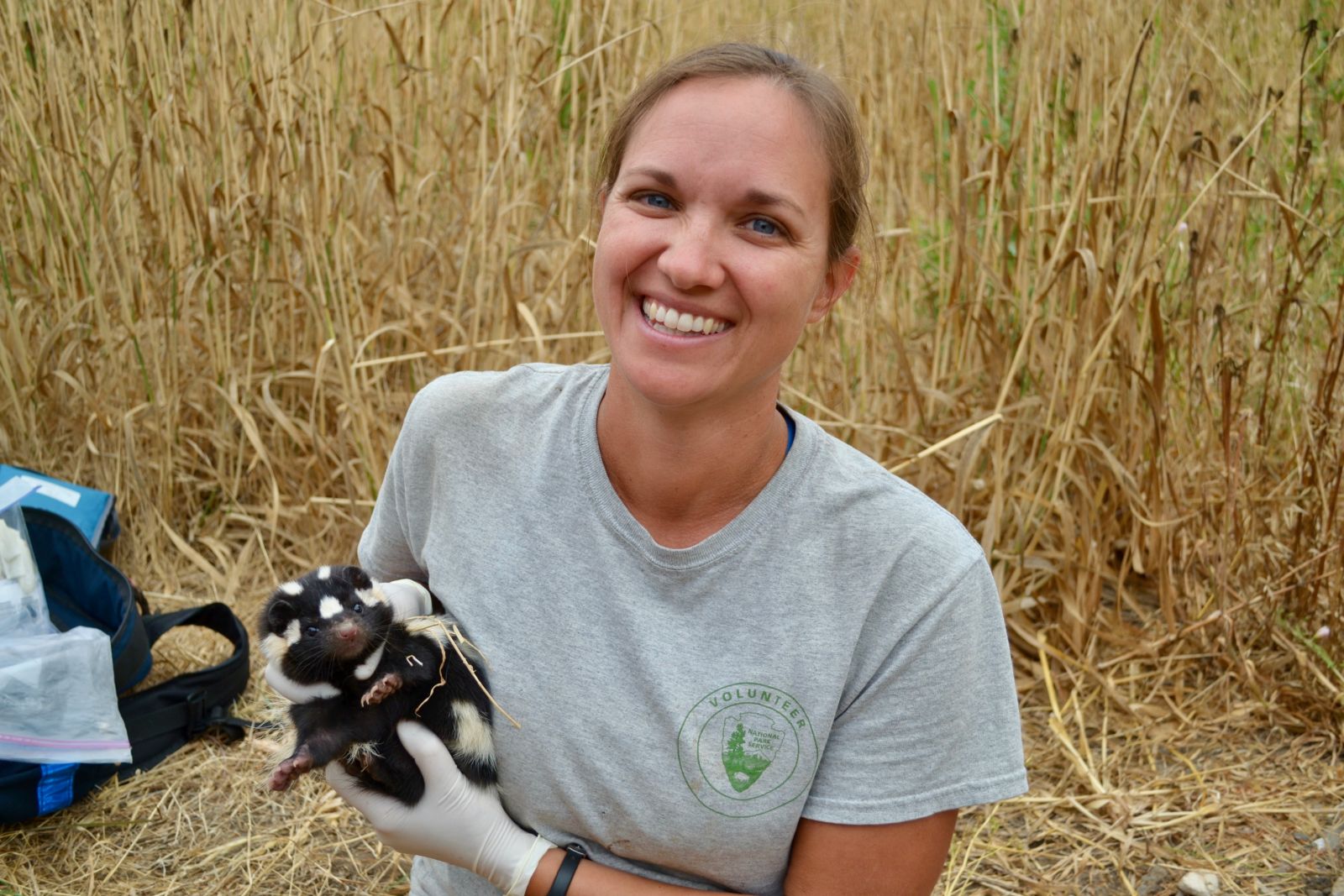
Ellie Bolas earned a double major BA in environmental studies and religious studies from the University of North Carolina at Chapel Hill, is completing a MS in Ecology at the University of California, Davis, and will begin her PhD in the same program in the fall of 2019. Her master’s research takes place on the California Channel Islands, and investigates the historical biogeography and population status of island spotted skunks, as well as their ecological relationships with island foxes. Ellie’s PhD will focus on predator-prey relationships between mountain lions and mule deer in urban and fire-prone ecosystems in the greater Los Angeles area. Outside of research, Ellie has worked extensively in science education and is an advocate for expanding diversity and equity in science and public access to engagement in research.
Colorado
Erin Sawa, 2025-
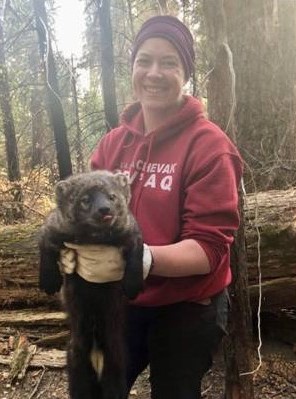
Erin is originally from California and made it to Colorado in 2010 by way of Texas. She graduated from Colorado State University in 2014 with a degree in Fish, Wildlife, and Conservation Biology. Erin has spent most of the last 10 years working as a technician on various research projects for Colorado Parks and Wildlife (piecing together work outside the state in Montana, Alaska, and California). Erin recently moved to Laramie to start a master’s at the University of Wyoming, looking at diet and habitat use of bobcats in northwest Colorado.
Florida
Zachary Wardle, 2024-
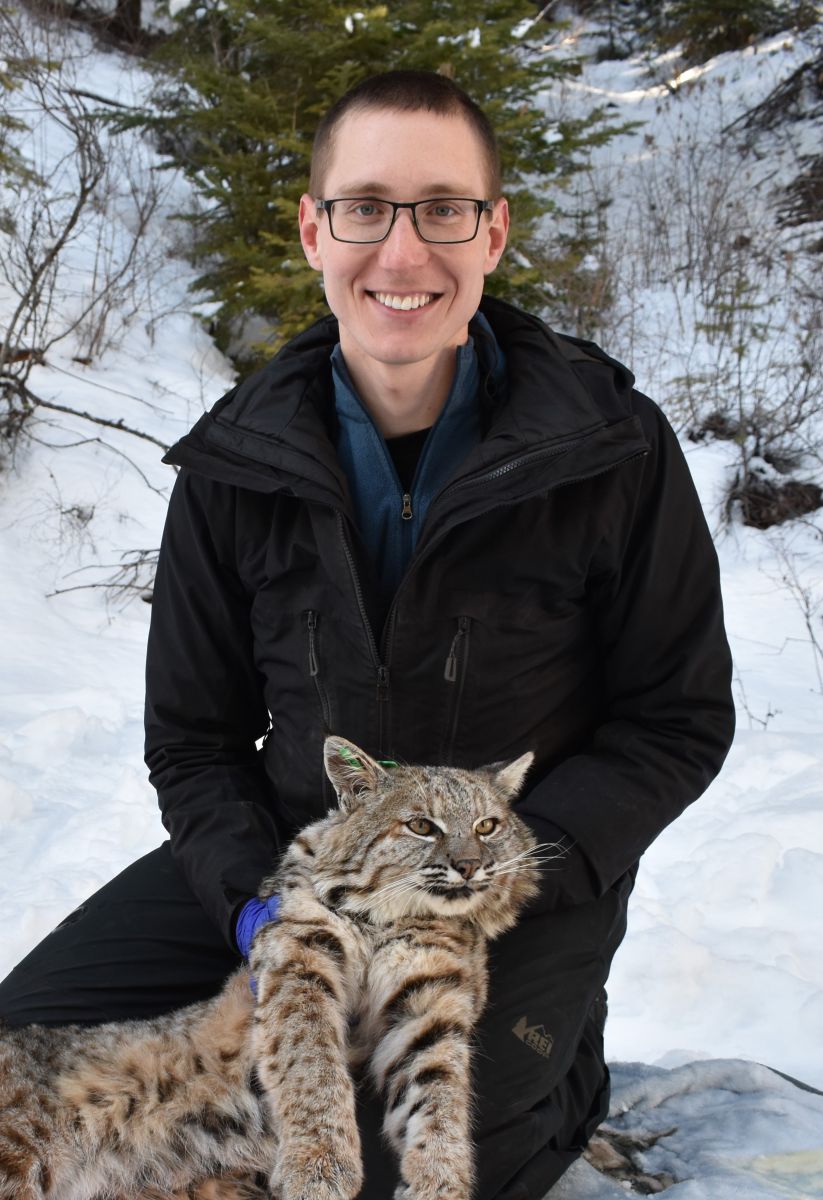
Zachary is a panther biologist with the Florida Fish and Wildlife Conservation Commission and an M.S. student in the Caesar Kleberg Wildlife Research Institute at Texas A&M University–Kingsville. He is working to develop incentive programs for Florida panther conservation on private lands, mitigate human–panther conflict, and support panther research and monitoring efforts. His Master’s research focuses on understanding panther spatial ecology in a changing landscape and aims to inform recovery efforts and conservation planning. Zachary is from southwestern Pennsylvania and received a B.S. in Environmental Science from American Public University. Prior to entering the wildlife field, he served four years in the U.S. Air Force working in geospatial intelligence and remote sensing. Zachary has assisted with university and agency wildlife research across the U.S., focusing on carnivore and predator-prey ecology. Recent work of his includes studies of the spatial and road ecology of ocelots and bobcats in South Texas. He has done field research on multiple other carnivore and ungulate species using a variety of techniques and is Level III certified in Wildlife Track and Sign by CyberTracker Conservation.
Idaho
Cameron Macias, 2020 -

Cameron is a PhD student at the University of Idaho under Dr. Lisette Waits and in collaboration with the Lower Elwha Klallam Tribe and Panthera. She is a member of the Lower Elwha Klallam Tribe in Port Angeles, WA and her graduate research examines cougar and bobcat population genetics and ecology in her Tribe's historic use area. She is using a combination of non-invasive genetic sampling (scat found using scat-detection dogs), GPS collars, and remote cameras to estimate population sizes, interactions, and movement and dispersal patterns of these two felid populations. A goal of the Olympic Cougar Project is to support connectivity research and test model outcomes with real data.
New Mexico
Vacant
North Dakota & South Dakota
Vacant
Oklahoma
Nathan Proudman, 2021 - 2023

Nathan Proudman is a PhD student in wildlife ecology and management at Oklahoma State University. He currently studies numerous components of bobcat ecology, their population trends, and abundances, in the state of Oklahoma. His research involves both citizen-science-derived occupancy data collected by student volunteers, and genetic capture-recapture studies in three areas of specific interest, using a combination of non-invasive methods. Originally from South Wales in the UK, Nathan received his bachelor’s degree in Biology from Bath Spa University in 2015. As part of his undergraduate research, and in collaboration with the research group Operation Wallacea, he studied niche separation in sympatric primate species in the Pacaya-Samiria National Reserve, Peru. Nathan obtained his master’s degree in animal ecology from Lund University, Sweden in 2018. His MS research focused on the behavioural responses of red deer to human hunters and wolves in the BiaÅ‚owieża Forest, Poland, and was conducted in co-operation with Polish Academy of Science’s Mammal Research Institute. He moved to the USA in the summer of 2018 to commence his doctoral studies. Since 2019, Nathan has been the ‘student at large’ for the Central Plains Society of Mammalogists.
Oregon
Vacant
Texas
Katherine McDaniel, 2024-

Katie is a M.S. student in the Spatial and Population Ecology of Carnivores Lab at Texas A&M University–Kingsville. She grew up in Maryland but moved to Colorado for her B.S., where she received her degree in Fish, Wildlife, and Conservation Biology from Colorado State University. She has worked on carnivore research projects across the U.S. pursuing interests in movement ecology, fragmentation, and population level disease spread. Some of her favorite positions have been studying bobcats in California, Canada lynx in Alaska, and mountain lions in Colorado. Katie is currently a graduate research assistant in the Feline Research Program at the Caesar Kleberg Wildlife Research Institute. Working with Dr. Lisanne Petracca and Dr. Mike Cherry, her current graduate project will document effects of the U.S. – Mexico border wall on mountain lion movement, dispersal, and genomics. Mountain lion populations in the border region are largely unstudied and the border structure itself is still actively being constructed. This presents an opportunity to study trans-boundary large carnivore movement and population genomics before, during, and after construction of the border wall. In her free time, Katie takes full advantage of her access to great Tex-Mex food and enjoys backpacking, traveling, and spending time with family.
Chloe Nouzille, 2024-
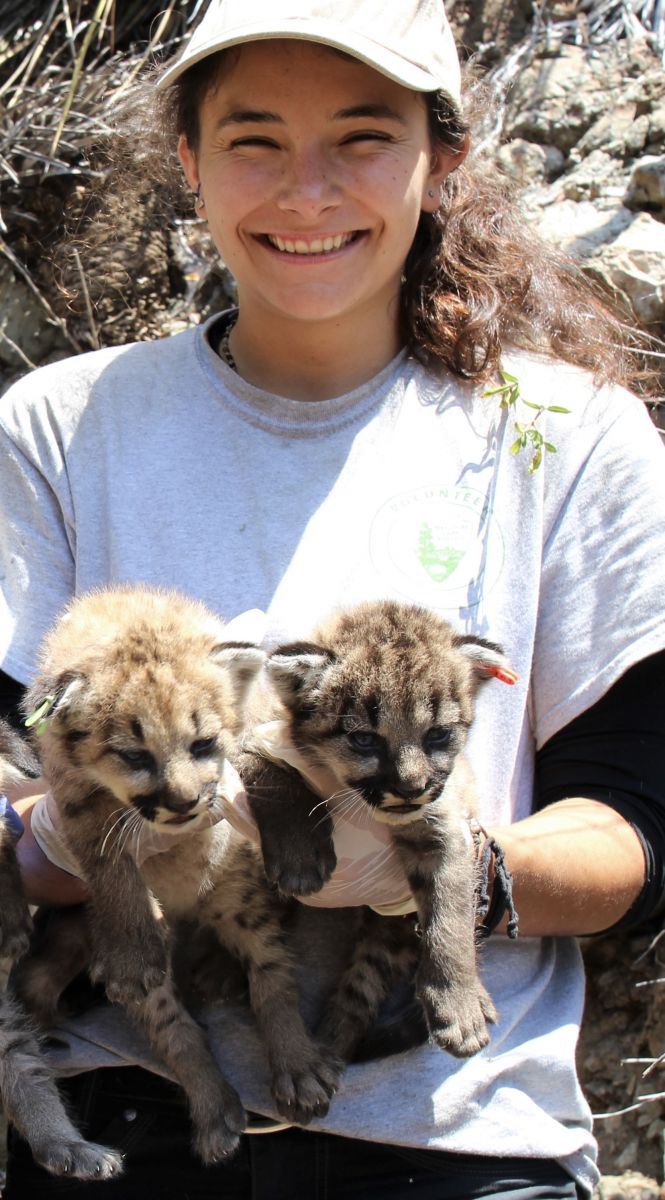
Chloe received her B.S. in Ecology and Evolutionary Biology from the University of California, Irvine. Over the course of her undergraduate career, she worked as a veterinary technician and a laboratory assistant in Irvine, and as a research assistant at Mabula Game Reserve in South Africa. Following graduation, Chloe interned with the National Park Service, studying mountain lions in the fragmented landscape of Los Angeles. Her M.S. at the University of California, Los Angeles, focused on mammal recovery and recolonization following one of California’s megafires. Now as a doctoral student with the Caesar Kleberg Wildlife Research Institute, Chloe's research explores mountain lion movement and foraging ecology in South Texas in the context of the US-Mexico border.
Utah
Vacant
Washington
Samantha Zwicker, 2021-

Samantha Zwicker is completing her doctorate in the Quantitative Ecology Laboratory at the University of Washington, Seattle. Her current doctorate and nonprofit research is being undertaken in the lower Peruvian Amazon and involves: assessing the effects of land use change on felids and their prey using camera trapping; estimating densities of regional jaguar and ocelot populations; investigating interspecific competition and spatiotemporal overlap between sympatric carnivores; and creating protocols for reintroducing felids to the wild. Sam is also the founder of conservation nonprofit Hoja Nueva and cofounder of wildlife sanctuary Wild World Initiative in Peru. Sam was a Wild Felid Legacy Scholar in 2019 for her project investigating felid diets and felid spatiotemporal overlap in the Madre de Dios region of Peru. She also received an NIH Global Health scholarship in 2017 and became a Panthera Grantee in 2020 to better investigate the smaller, more elusive and often arboreal felids of the Amazon rainforest. Sam received her bachelor’s with honors from the University of Washington's Program on the Environment in 2012, her master’s in wildlife ecology in June of 2015, and a degree in Nonprofit Management in 2016.
Wyoming & Montana
Connor Meyer, 2022-
.jpg)
Connor grew up in western Washington where he gained an appreciation for the outdoors while bouncing between the Cascades and Puget Sound. After graduating from the University of Washington with a degree in wildlife conservation he spent six years gaining experience in wildlife research. During that time he was lucky enough to engage and work with many projects and study systems including snowshoe hares, salmon and mountain lions in Washington, snow leopards and wolves in eastern Kyrgyzstan, and spent a bulk of the last five and half years understanding predator prey dynamics and the ecology of wolves and mountain lions with the Yellowstone Wolf and Cougar projects. Connor began his PhD in fall of 2021 at the University of Montana in the Ungulate Ecology Lab, studying factors driving migration switching in the Ya Ha Tinda elk herd. When not in the office or the field, Connor can be found attempting to stave off injury while running, hiking, biking and skiing.
Past Student Representatives:
ARIZONA: Ashwin Naidu, U of A, 2013-15
CALIFORNIA: Yiwei Wang, UCSC, 2013-15; Veronica Yovovich, UCSC 2013-2016; Justine Smith 2016-2019; Anna Nisi 2019-2021
COLORADO: Patrick Lendrum, CSU, 2015-2017; Jen Timmer, CSU, 2013-2014; Annie Kelner, 2018-2020; Erin Weingarten, 2021-2022: Anneke Hart, 2023-2024
FLORIDA: Brandi-Jo Petronio, University of Florida, 2013
GEORGIA: Kelsey Turner, U of GA, 2016-17; Barbara Shock, University of Georgia, 2011-2014
KENTUCKY: Glen Kalisz, Eastern Kentucky University, 2016
NEVADA: Sarah Hegg, University of Nevada, 2014-15
ILLINOIS: Rebecca Lyon, SIU, 2017; Jessica Fort, SIU, 2015; Julia Smith, SIU, 2013-14
NEW ENGLAND: Meredith Palmer, 2015-2020.
NEW MEXICO: Susan Bard, NMSU, 2015-2016
NORTH CAROLINA: Michael Cove, NC State University, 2013-2015.
NORTH & SOUTH DAKOTA: Randy Johnson, SDSU Brookings,2015-2017; Emily Mitchell, SDSU, 2018; Marlin Dart, SDSU 2019-22
OREGON: Beth Orning, OSU, 2015-2019; Joel Ruprecht, Oregon State U, 2019-2021; Charlotte Eriksson, OSU
TEXAS: Price Rumbelow, Sul Ross State University 2014-16; Michael Stangl, Sul Ross State University 2017-19; Zachary Wardle, Texas A&M, 2020-2023
UTAH: Cheyenne Burnett, USU 2013; Jonathan Fusaro, USU 2014; Peter Mahoney, USU 2015
WASHINGTON: Michael Havrda UW 2016-17; Matt Warren, Western Washington University, 2014-15
WYOMING & MONTANA: Colby Anton UCSC, 2015-2019; Jennifer Feltner, Univ of Montana, 2020-2021
CANADA - ALBERTA: Mitchell Flowers, Univ of Alberta, 2018-2019
